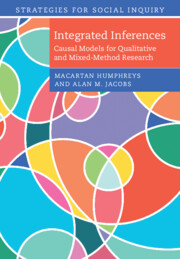Book contents
- Frontmatter
- Contents
- Preface
- Acknowledgments
- 1 Introduction
- Part I Foundations
- Part II Model-Based Causal Inference
- 7 Process Tracing with Causal Models
- 8 Process-Tracing Applications
- 9 Integrated Inferences
- 10 Integrated Inferences Applications
- 11 Mixing Models
- Part III Design Choices
- Part IV Models in Question
- Part V Appendices
- Bibliography
- Index
8 - Process-Tracing Applications
from Part II - Model-Based Causal Inference
Published online by Cambridge University Press: 13 October 2023
- Frontmatter
- Contents
- Preface
- Acknowledgments
- 1 Introduction
- Part I Foundations
- Part II Model-Based Causal Inference
- 7 Process Tracing with Causal Models
- 8 Process-Tracing Applications
- 9 Integrated Inferences
- 10 Integrated Inferences Applications
- 11 Mixing Models
- Part III Design Choices
- Part IV Models in Question
- Part V Appendices
- Bibliography
- Index
Summary
We apply the causal-model-based approach to process tracing to two major substantive issues in comparative politics: the relationship between inequality and democratization and the relationship between institutions and growth. Drawing on case-level data, we use qualitative restrictions on causal types together with flat priors to draw inferences about a range of causal queries. The applications illustrate the different types of learning that can be gleaned from information on moderators and mediators, as well as the scope for learning from historical data when researchers have informative beliefs about confounding processes.
Keywords
- Type
- Chapter
- Information
- Integrated InferencesCausal Models for Qualitative and Mixed-Method Research, pp. 189 - 216Publisher: Cambridge University PressPrint publication year: 2023

